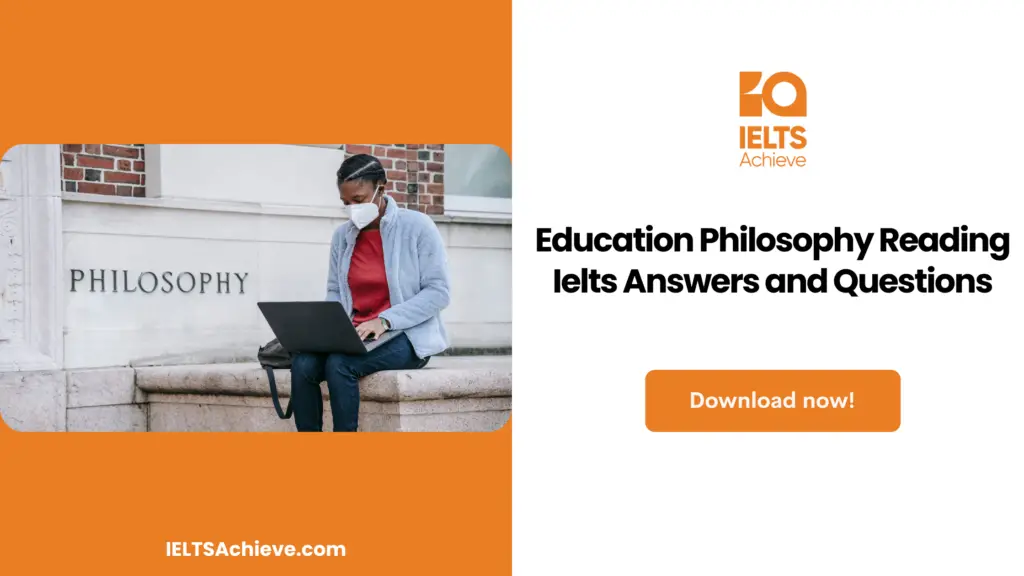The Blog post contains the following IELTS Reading Questions:
- IELTS Reading Matching Headings
- IELTS Reading Matching Features
Stay informed and prepared for success – Explore our comprehensive Reading Test Info page to get valuable insights, exam format details, and expert tips for mastering the IELTS Reading section.
IELTS reading passage – Education Philosophy

Education Philosophy
Although accurate statistics on pre-industrial child mortality are lacking, there is evidence that in the 1660s, the mortality rate for children who died within 14 days of birth was as high as 30%. Nearly all families suffered some premature death. Since all parents anticipated burying some of their children, it was difficult for them to invest in their newborns’ children. In addition, to protect themselves from the emotional repercussions of their children’s deaths, parents avoided developing an emotional attachment to infants. It is not surprising that mothers abandon their infants and leave them in gutters or mention their deaths in the same sentence as pickles.
The 18th century witnessed the transition from an agrarian to an industrial economy, one of the most significant societal shifts occurring in the Western world. A growing number of individuals left their villages and small towns for the vastly different lifestyles of large cities. Previously existing social services in smaller communities have been replaced by ruthless issues such as poverty, crime, substandard housing, and disease. Due to the necessity for additional income to maintain the family, young children from the poorest families were compelled to begin working at a young age, drastically shortening their childhood. Children as young as 7 may be forced to work full-time in factories or as prostitutes in deplorable and hazardous conditions. Although this function has vanished from the majority of affluent nations, child labour still remains a staple in underdeveloped countries and rarely disappeared entirely.
During the 1800s in the United States, children’s lives witnessed a dramatic transformation. Historically, both rural and urban children were required to participate in daily labour due to the prevalence of manual hardworking. However, as a result of the technical advancements of the mid-1800s, coupled with the rise of the middle class, and the reinterpretation of family responsibilities, work and home became less synonymous over time. People started buying books and toys for their children. When the nation became more dependent on machines, rural and urban youngsters were less likely to be obliged to work at home. This trend, which began with the Industrial Revolution and rose gradually throughout the 19th century, accelerated exponentially following the Civil War. John Locke, one of the most prominent writers of his time, provided the first clear and comprehensive statement of the ‘environmental viewpoint’ that parental education determines a child’s life and via this becoming the father of modern learning theory. During the colonial period in America, his lectures on child care achieved widespread popularity in America.
People were ‘noble savages’ in the original state of nature, meaning they are innocent, free and uncorrupted according to Jean Jacques Rousseau who lived in an era of the American and French Revolution. Rousseau’s famous novel Emile, published in 1762, was written to express his educational philosophy through the story of a boy’s education from infancy to adulthood. This book was based on his extensive observations of children and adolescents, their individuality, his developmental theory, and his own childhood recollections. In terms of historical context and developmental psychology, he contrasts children to adults and describes their age-specific traits. During the early phases of the Industrial Revolution, Johan Heinrich Pestalozzi endeavoured to establish schools that would foster the holistic development of children. He concurred with Rousseau that humans are naturally good, but have been spoiled by a corrupt society that had eventually tainted them. His teaching methods comprises both general and specialised procedures, and his theory was based on developing an emotionally healthy home-like learning environment prior to delivering more particular instructions.
Victor, a so-called feral youngster captured in a tiny village in the south of France in 1800, is one of the best-documented cases of Pestalozzi’s idea. Victor had been observed searching for food in the gardens of locals in the prepubescent, mute, naked, and perhaps 11 or 12 years old, Victor had been seen foraging for food in the gardens of inhabitants in the area, and had sometimes accepted people’s direct offers of food before his final capture. He was eventually taken to Paris and expected to solve some profound concerns regarding the nature of humanity, but that purpose was quickly abandoned. Jean Marc Gaspard Itard, a young physician, was enthusiastic about Victor’s future and devised a five-year education programme to civilise him and teach him to talk. Itard hired a local woman Madame Guerin with the help of a government subsidy to assist him build a semblance of a home for Victor, and he spent a significant amount of time and effort with Victor. Itard’s objective of teaching Victor the fundamentals of speech would never be fully achieved, but Victor had learnt some elementary communication skills.
Although other educators were beginning to recognise the fundamental truth embedded in Rousseau’s philosophy that simply identifying the stages of a child’s growth is insufficient. There must be a specific education that is tailored to certain stages. The invention of kindergarten, a concept and a movement developed by a German-born educator Friedrich Froebel in 1840, is one of the earliest examples. Froebel emphasises the significance of play in children’s education. His invention will eventually spread over the world in a variety of ways. Through his collaboration with Johann Heinrich Pestalozzi, Froebel was able to develop his theories. Froebel, who had been a teacher for four decades, didn’t develop the notion of kindergarten until he was 58 years old. The idea was to provide a haven and a preparation for children who were about to enter the regimented educational system. His kindergarten education was based on guided or structured play since he believed that play was the cornerstone of child development at this age. A child’s emotional development and to achieve a feeling of self-worth are facilitated by play. In the meantime, teachers organised resources and a controlled environment so that each child could attain these goals as an individual. Before Froebel’s death in 1852, dozens of kindergartens had been established in Germany. In the 20th century, the kindergarten movement originated in Europe and spread to the United States, where it prospered.
Unlock your full potential in the IELTS Reading section – Visit our IELTS Reading Practice Question Answer page now!
Recommended Questions:
Renewable Energy IELTS Reading Question with Answer
Education Philosophy reading questions
Questions 1 – 4
Reading Passage 1 has six paragraphs, A-F. Choose the correct heading for paragraphs A and C-E from the list of headings below. Write the correct number, i-vii, in boxes 1-4 on your answer sheet.
List of Headings
i The inheritance and development of educational concepts of different thinkers
ii Why children had to work to alleviate the burden on family
iii Why children are not highly valued
iv The explanation for children dying in hospital at their early age
v The first appearance of modem educational philosophy
vi The application of a creative learning method on a wild kid
vii The emergence and spread of the notion of kindergarten
1 Paragraph A
Example Answer
Paragraph B ii
2 Paragraph C
3 Paragraph D
4 Paragraph E
Ready to conquer Matching Headings questions? Click here to learn essential tips and techniques for matching headings accurately to paragraphs or sections in the IELTS Reading section.
Questions 5 – 8
Look at the following events (Questions 5-8) and the list of dates below. Match each event with the correct date, A, B or C.Write the correct letter, A, B or C, in boxes 5-8 on your answer sheet.NB You may use any letter more than once.
List of Dates
A the 18th century (1700-1799)
B the 19th century (1800-1899)
C the 20th century (1900-1999)
5 the need for children to work
6 the rise of the middle class
7 the emergence of a kindergarten
8 the spread of kindergartens around the U.S.
Improve your performance in Matching Features questions by clicking here to access our comprehensive guide. Learn how to match specific features or characteristics with the options provided in the IELTS Reading section.
Questions 10 – 13
Look at the following opinions or deeds (Questions 9-13) and the list of people below. Match each opinion or deed with the correct person, A, B, C or D. Write the correct letter, A, B, C or D, in boxes 9-13 on your answer sheet.NB You may use any letter more than once.
List of People
A Jean Jacques Rousseau
B Johan Heinrich Pestalozzi
C Jean Marc Gaspard Itard
D Friedrich Froebel
9 was not successful to prove the theory
10 observed a child’s record
11 requested a study setting with emotional comfort firstly
12 proposed that corruption was not a characteristic in people’s nature
13 was responsible for an increase in the number of a type of school
Improve your performance in Matching Features questions by clicking here to access our comprehensive guide. Learn how to match specific features or characteristics with the options provided in the IELTS Reading section.
Unlock your full potential in the IELTS Reading section – Visit our IELTS Reading Practice Question Answer page now!
Recommended Questions:
Renewable Energy IELTS Reading Question with Answer
Education Philosophy reading answers
1. Answer: iii
2. Answer: v
3. Answer: i
4. Answer: vi
5. Answer: A
6. Answer: B
7. Answer: B
8. Answer: C
9. Answer: C
10. Answer: A
11. Answer: B
12. Answer: A
13. Answer: D


